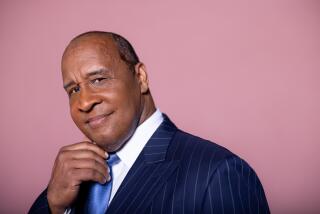1st Black Mayor Elected in Savannah, Ga. : Politics: Residents of segregated Southern city adjust to latest shattered racial barrier.
- Share via
SAVANNAH, Ga. — Three days after this regal coastal city elected its first black mayor, the campaign manager warned the staff: Beware of all packages delivered to the office.
No one had threatened violence but “we can’t take any chances,” he said.
In a majority black city that has thrived on all-white social clubs, segregated neighborhoods and separate debutante balls for each race, residents are adjusting to the latest shattered racial barrier.
“It was long, long overdue, but changes are happening in Savannah,” said W.W. Law, a black historian who led the local NAACP chapter for 26 years. “Now, as the world’s eyes look to Savannah, there will be an African American at the helm and that’s as it should be.”
The city is in the national spotlight as site of the 1996 Olympic yachting events and setting for “Midnight in the Garden of Good and Evil,” John Berendt’s best-selling account of a murder in the historic home of a gay antiques dealer.
Before black newspaper publisher Floyd Adams Jr. narrowly beat white incumbent Susan Weiner last month, Savannah already had witnessed the admission of the first black to an elite all-white yachting club, the birth of a civil rights museum financed by local tax dollars and the lifting of a long-standing federal court order to desegregate the schools, all within the last two years.
The rotund, bespectacled Adams, an alderman for 13 years, knows he owes his 256-vote victory margin to a small white crossover vote. “They have faith in me that I will work hard and I won’t cause them any harm or damage,” he said.
Georgia’s oldest city (pop. 140,000) has long suffered subtle bigotry, but never racial violence, thanks to its veneer of Southern gentility.
“Savannah never had a black lynching,” said college professor John Duncan, who teaches a course on city history. “There’s a sense of civility here.”
But peel back that layer and Savannah reveals its quirky, scandalous side. As Berendt’s book illustrates, Savannah is an odd mix of cotillions and drag shows, bluebloods and funky art students. Although the city is tolerant of its natives’ foibles, nothing is begrudged more than outsiders.
“I don’t know what race problems you’re talking about,” said former Mayor John Rousakis, who served 21 years before he was ousted by Weiner in 1991. “I think we’ve done a hell of a job.”
While millions of tourists flock each year to its cobblestone riverfront and stately squares, Savannah’s black neighborhoods suffer the same blight as many inner cities: poverty and ramshackle housing. And blacks are typically missing from top corporate boards and social clubs.
“The black community is justifiably proud. The white community is holding its breath,” said architect Eric Johnson, a white Republican state senator. “If Floyd immediately reaches out and shows that he’s pro-business, then there will be a big sigh of relief.”
During this last campaign, Susan Weiner ran a radio commercial that said the “small difference” between Adams and her was that she is white and he is black. She denied injecting race into the contest.
Adams has pledged that his first act upon taking office Jan. 2 will be to create a human relations commission “to bring this city back together.”
More to Read
Sign up for Essential California
The most important California stories and recommendations in your inbox every morning.
You may occasionally receive promotional content from the Los Angeles Times.













